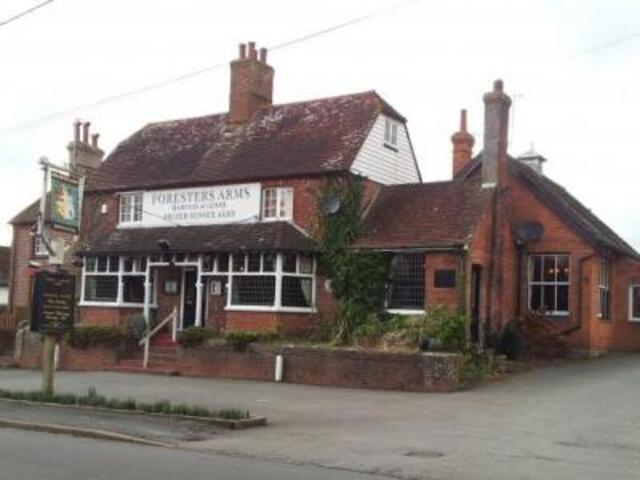» Main Index

» Search This Site

» Submit Update

» Contact Us


|
|

|
Home > Sussex >
East Hoathly > Foresters Arms
Foresters Arms
 |
|
|
Picture source: Mike
Phillips |
|
|
|
|
The Foresters Arms was situated on South Street.
This pub closed in 2017. |
|
|
|
|
|
A building in the position of the
Foresters Arms, on the north side of South Street close to the junction with
Church Marks Lane, first appears on Yeakell and Gardner’s 1778-83 map of
Sussex. The stylised outline form shown on the map offers little to
distinguish the building, but the historic fabric is consistent with a mid-
to late-C18 date. In its original form the building appears to have
consisted of a pair of semi-detached cottages with simple front and back
room floor-plans over two storeys (plus an attic), mirrored either side of a
central stack and lobby entrance. From the evidence of the East Hoathly
tithe apportionment, made in 1839, the building was still in use as two
separate cottages at this time.
During the C19 the cottages were converted to serve as a public house. The
exact date at which the conversion was made is not clear. It was certainly
no earlier than the 1840s, until which time the cottages were clearly
tenanted. However, it may not have been long after: according to records of
Harvey’s Brewery, the Foresters Arms was one of the seventeen initial public
houses that by 1859 were being supplied porters, stouts and mild ales by the
Lewes-based brewery. Several alterations and additions to the C18 core were
made over the course of the latter half of the C19, mostly associated with
its new function. By 1875 an additional cottage of more compact proportions
had been built against the west end. Following this, a new block was
constructed against the east side of the C18 cottages. This consisted of a
bar parlour, stables and a toilet block. In addition, the space between the
two rear wings was infilled, with a new larder created in the former void.
This work is all shown on the ‘as existing’ plan of 1907 produced by Harvey
and Son when they acquired the pub, although on stylistic grounds this was
probably undertaken in the late C19.
Shortly after taking over the pub in 1907, Harvey and Son set about planning
their own improvements. Light was brought into the two front bar rooms with
the introduction of a pair of broad bay windows, which were set under a
unifying timber-supported entrance canopy. As part of this work the two
separate entrances (shown in an early photograph and probably associated
with the initial conversion of the cottages) were replaced with a single
entrance to a lobby area accessing the two front bar rooms. A contemporary
internal remodelling saw new panelling and bar fittings installed. A
subsequent phase of work initiated by Harvey and Son, planned in 1907
although suspended until after the First World War, was the construction of
a new luncheon and tea room/hall and a small store to replace the late-C19
stables to the east (approved in 1922). This addition was built in response
to what the brewery perceived as a ‘considerable demand, by people passing,
for luncheons and tea’, as the Sussex Express of 10 November 1922 reported.
Some minor changes to the pub were made in the mid-C20, with a new toilet
block and store built up against the 1922 hall. Several internal alterations
were made around this time also, which included the removal of the stairs of
the eastern cottage to enlarge the bar room and the removal of the dividing
brickwork in the central stack to allow circulation between the front east
and west bar rooms. In addition, the opening in the east wall with the bar
parlour was widened. In 1980 a new ground-floor beer ‘cellar’ was added to
the rear of the west cottage (removing part of the original north wall on
this side). A square porch was added to the east side of the 1922 hall, with
a new opening created to allow access to the bar parlour and central bar
rooms from this side. Since the 1990s, a new counter has been added to the
east bar room and an extended counter with bar back fittings (covering the
former fireplace in the centre of the west wall) were installed in the east
hall in around 2015. |
|
Source: Historic England |
|
|
|
Do you have any anecdotes, historical information, updates or photos of this pub? Become a contributor by submitting them here.
You can also make email contact with other ex-customers and landlords of this pub by adding your details to this page. |
|
|